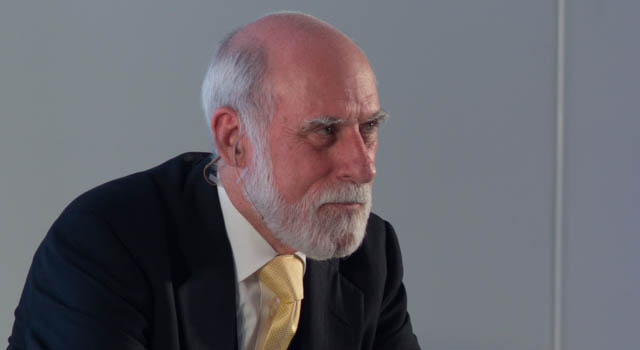
The future will be about getting more people online, sometimes in unexpected ways, about technology that interacts without our physiology, about reevaluating how education works, and about expanding our existing communications networks beyond our own planet.
These are some of the things Google’s chief Internet evangelist, Vint Cerf, believes are in humanity’s future. Cerf made the comments during an interview at Google’s Big Tent event held in Johannesburg on Thursday.
Asked about what new technology excites him, Cerf began talking about getting more people connected — unsurprising given his history as one of the pioneers of the early Internet.
“We’ve got to look at alternative ways of delivering high-speed services,” he said, citing Google’s Project Loon — a maverick endeavour being piloted in New Zealand to use high-altitude balloons to provide Internet connectivity to outlying areas — and another project called O3b.
“O3b stands for ‘Other Three Billion’,” Cerf explained. “It’s a non-synchronous satellite system in orbit over the equator.” The satellites are at a lower altitude than traditional satellites, which results in a “better signal to noise ratio”.
“It’s possible to transfer a billion bits per second per spot beam and there are ten beams per satellite,” Cerf said. “This means we can provide 10Gbit/s aggregate capacity to ground stations and that gives us the opportunity to reach sub-Saharan Africa, the Pacific Islands, South America, and so on.”
Cerf talked about Nicholas Negroponte’s “One Laptop Per Child” project to deliver affordable and connected devices into education in developing countries, which he said “didn’t work out as hoped”. The interesting thing to flow from the One Laptop project was the realisation that devices with Wi-Fi could be used to create self-managing, impromptu “mesh networks”.
“So, if one device had good quality access to the Internet, it could distribute to rest of the devices within earshot. That’s very attractive for the casual creation of networks where you wouldn’t have any at all.”
Project Loon is looking at mesh networks as a means of potentially providing connectivity in disaster-hit or remote areas by passing the connection from balloon to balloon, possibly across enormous distances.
Neuro-electronics
Another area that has Cerf excited is “neuro-electronics” — interconnecting computer-based things with our neurological circuits, as he describes it.
Cerf’s wife lost her hearing at three years of age. Years later, she had a specialised implant that inserted 15 to 20 electrodes into her cochlea. This was later fed signals by an FM transmitter. “We know enough to fool the brain into thinking its audio is working by stimulating the auditory nerve,” he said, adding that he thinks neuro-electronics is set to be a “big deal”.
On the other end of the technology spectrum, Cerf said he sees richer networking that will allow mankind to communicate beyond the Earth — an interplanetary extension of the Internet.
Work in this regard is already fairly advanced. Rich networking is now available to support manned and robotic exploration of the solar system, but new systems and standards have had to be developed because the excessive delays to transfer data using the transmission control protocol render it impractical for the purpose, Cerf said.
When looking at a planet or sending data to or from it, as in the case of the Mars Rover for example, one of the problems is planetary rotation. Because planets rotate, a signal sent to or from a specific point on the surface may not reach its intended target. “Planetary rotation is a problem,” Cerf said. “We haven’t figured out how to stop that.” — (c) 2013 NewsCentral Media

